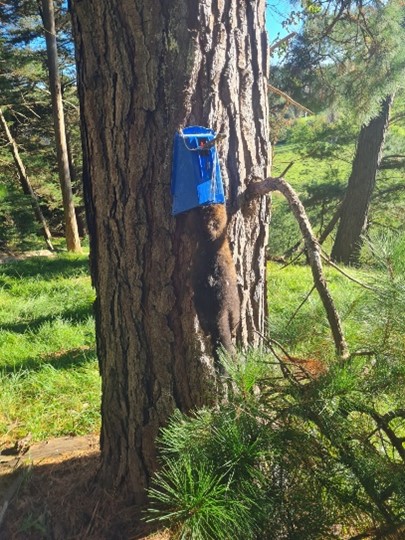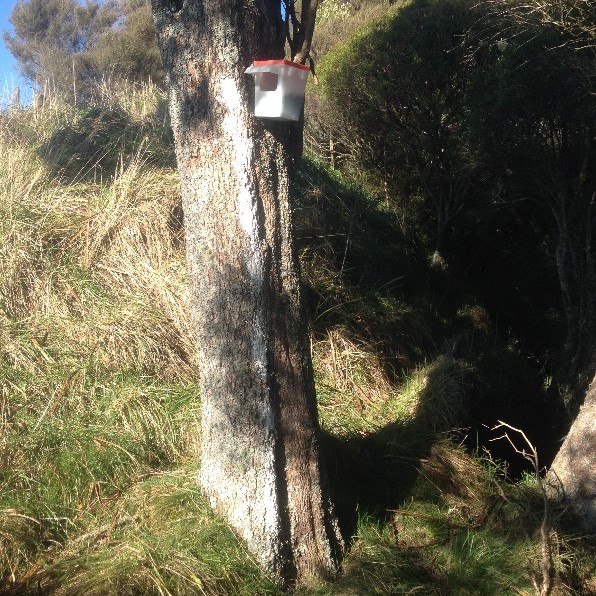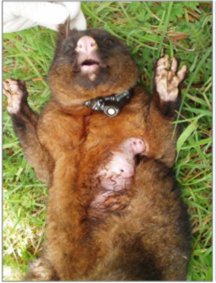What is the RPCP?
The Regional Predator Control Programme (RPCP) is a Greater Wellington initiative to control possums and other predators that threaten our native biodiversity and agricultural economy.
Historical programme
Historically, the RPCP programme built upon and maintained the efforts of OSPRI’s TBfree programme in areas that had been declared TB-free. The TBfree programme focused on eradicating bovine tuberculosis (TB) in possum populations to reduce risks to the agricultural sector. However, in some regions where possum control had ceased and transitioned to a surveillance phase following OSPRI operations, these areas remained classified as vector risk zones. The RPCP programme was only able to operate in areas officially declared TB-free, where both control and surveillance activities had ended.
New direction
Areas still under OSPRI surveillance management within the Greater Wellington Region are seeing possum populations increase, leading to renewed pressure on both native biodiversity and livestock. There for the RPCP programme has shifted its focus to deliver better outcomes for higher value biodiversity. In the initial shift, possums will remain a key species of focus due to the scale of their impact on both high value biodiversity and the economy. The shift also includes an increasing focus on other predators such as pest cats, mustelids (stoats, ferrets, weasels), rodents and hedgehogs at specific locations.
As the programme shifts its focus to these high value biodiversity areas, we will take a more targeted approach to controlling predators in the existing control areas. If landowners wish to continue pest control by themselves, Greater Wellington can provide advice, offer bait and traps at below retail cost, or even gift existing bait stations currently in place from previous operations.
Why focus on high value biodiversity
These high value biodiversity areas provide suitable conditions for predators to build up source populations through having a rich food source and shelter all year round. Native broadleaf forests are known to hold nearly five times as many possums as open pasture. Managing possums and predators in and near high value biodiversity habitats bring benefits to native species in these areas and to the larger landscape bordering them.
Why control these pests?
 Introduced pest species consume large amounts of native vegetation and eat the eggs and chicks of native birds as well predating on native invertebrates. Possums and other predators cause significant damage to native biodiversity, the local economy, and mana whenua and community values.
Introduced pest species consume large amounts of native vegetation and eat the eggs and chicks of native birds as well predating on native invertebrates. Possums and other predators cause significant damage to native biodiversity, the local economy, and mana whenua and community values.
Reducing possum and predator populations allow native bush, birds, lizards and insects to thrive. Native species play a key role in seed dispersal, pollinating flowers and form an integral part of the food chain which supports healthy ecosystems. The reduction of possums helps protect farms from grazing pressure and minimises damage to fruit trees and gardens, while reducing feral cats and mustelids prevent the spread of diseases to livestock and poultry farming.
Possums can bounce back
To minimise the reinvasion rates in areas without ongoing control, such as some of the large-scale possum control projects Greater Wellington is focusing on, we are using a range of additional strategies to manage these species and operational areas. This includes using natural barriers and buffer areas such as rivers, coastlines, ridgelines, and built structures like roads to limit movement and better target these pests across the landscape.
This will ensure longevity of the work being undertaken and the reduction of pests reinvading into the controlled area. Possums will generally not cross water ways as part of moving around the landscape unless there is a structural feature such as a bridge is present, this becomes a highway crossing, which also means it is a key area to control.
In certain significant areas, we’re maintaining ongoing possum control to ensure populations remain very low and to stop reinvasion from occurring.
We will work collaboratively with other projects such as Pūkaha Mt Bruce, Capital Kiwi, and local catchment groups, as well as align with predator control operations in other agency programmes like our Key Native Ecosystem and Wairarapa Moana initiatives. We’ll also continue to work alongside OSPRI and DOC and look for opportunities to strengthen our collaboration with mana whenua.
Future TB risks
Despite rising possum numbers, and intensive livestock and wildlife testing, no TB has been detected in cattle in the Wellington region recently. OSPRI have now shifted their focus from control throughout most of the region to a surveillance phase, with ongoing monitoring of TB through livestock testing and wildlife postmortems (mainly pigs). Control will still continue in the Remutaka and Tararua ranges in the short term.
The success of the programme also relies on farmers to comply with NAIT legislation. This includes keeping up to date with TB testing and movement control requirements, ensuring hunters do not dump/release deer and pigs, and not moving untraced livestock from areas where TB is known to be present.
TB symptoms in possums
Possums contract TB easily, quickly becoming infectious and dying within 4-6 months. Advanced cases can have visibly swollen lymph nodes or abscesses at the groin or armpits that can burst, spreading bacteria over the body.
If you suspect you have found a possum infected with TB, contact OSPRI on 0800 482 463.
Why should I allow the Programme on my property?
If you are within Greater Wellington’s identified areas, taking part in the RPCP is an opportunity to protect you and your neighbours’ properties from the impacts of possums and other predators. These species don’t abide by boundary lines and neither does their impact. Therefore, benefits for biodiversity brings benefits for the local economy, as well as mana whenua and community values. For the RPCP to be effective, it will require a collective approach towards a common goal across the region.
The programme is fully funded through general rates. If your property is within the proposed operational areas, Greater Wellington has set methodologies to maximise effort and lower the costs of control. Should the landowner want different control methods to the standard use of methods, the council will work with the landowner to find the best solution. Using alternative methods, however, may incur additional costs to the landowner. Greater Wellington is taking a “work with the willing” approach and encourages landowners to make the most of this opportunity.
What do I need to do?
Greater Wellington staff will contact eligible property owners, seeking permission to undertake pest control using the most efficient methods.
If you fall outside of one of these operational control areas or want more control when we are not working within the area, you are able to purchase baits and traps at cost price from us. You may also seek advice from Greater Wellington and, where practical, we may consider a cost recovery service.
What can be done to get rid of possums and predators?
Greater Wellington uses a range of toxins and trapping techniques to control pest animals. We need to use the most cost-effective methods for each situation and ensure we can afford to treat as much of the region as we can.
Toxins are typically dispensed from bait stations, which may be left in place permanently. Bait stations are typically serviced numerous times during the control phase.
Maintenance control will be undertaken to keep possum numbers to low levels in key parts of operational areas, Servicing of traps and bait stations are planned on a periodic basis or longer, dependent on species monitoring, programme priorities and how efficient control was in the area. If landowners and interested in continuing possum or predator control on their properties in the existing control areas, Greater Wellington may gift these bait stations to landowners rather than remove them. These landowners would also be able to purchase bait and traps at a lower cost than retail prices.
The main toxins used in the RPCP include Brodifacoum, Cyanide and 1080.
Kill traps are an important tool for controlling possums. Live traps are generally more expensive to operate and their use will be limited to allow for effective use of resources elsewhere.


Get in touch
- Phone:
- 0800 496 734
- Email:
- info@gw.govt.nz

